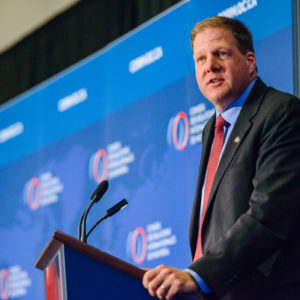This morning, I vetoed two bills — Senate Bills 365 and 446 – which combined would cost New Hampshire electric ratepayers approximately $100 million over the next three years. New Hampshire has some of the highest electric rates in the country, placing financial strain on the elderly, those on fixed incomes and the business community. These bills send our state in exactly the wrong direction. We need to be taking steps to lower electric rates, not passing legislation that would cause massive increases.
Senate Bill 365 creates another immense subsidy for New Hampshire’s six independent biomass plants. It would cost New Hampshire ratepayers approximately $25 million a year over the next 3 years, on top of the subsidy for these plants that already became law last year through Senate Bill 129. Furthermore, Senate Bill 365 doesn’t even guarantee solvency of these facilities and in fact, those who supply the wood product have confirmed that the maximum impact to their revenue would be a mere 3.5%. It harms our most vulnerable ratepayers and our job creators for the benefit of a select few.
While I agree that expanding net metering could be a benefit to our state, Senate Bill 446 would cost ratepayers at least $5 to $10 million annually and is a handout to large scale energy developers. These immense projects should use incentives already available and compete on their own merits. The businesses and working families of our state should not have to provide additional unjust taxation through higher electric bills. We should take the time necessary to study the effects of the recent Public Utilities Commission order on net metering before massively increasing the scale of projects that rely on ratepayer subsidies.
Consistent with our state’s 10 Year Energy Strategy, I am committed to working to encourage and advance renewable energy generation and fuel diversity without unjustly burdening the ratepayers of New Hampshire, which is why I vetoed these two bills today.
Exclusive to NHJournal.com. Must credit.

